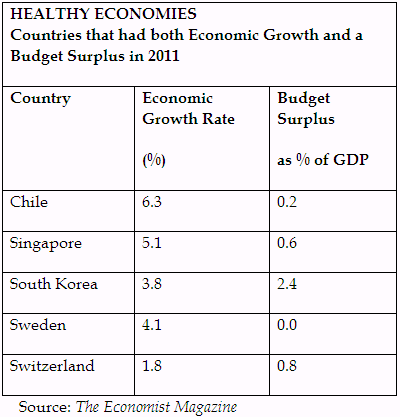The End Of Deficit Spending?
From the desk of Richard Rahn on Tue, 2011-12-27 19:12
In democratic countries, many politicians get themselves elected by making promises for spending programs that the citizens cannot or are unwilling to pay for. The result is persistent deficit spending that ultimately spirals out of control. The good news is that some democratic countries have learned how to avoid the spending/deficit trap, and those countries can serve as examples for the less prudent majority. (See chart below.)
The best example is Switzerland. The Swiss have managed to be fiscally responsible for many decades, in part because they have a highly decentralized, direct democracy. Most governmental functions take place at the local level rather than the federal level in Switzerland, and as a result, the local governments must compete with each other on taxes, regulations, etc., which tends to hold down the growth in government and promotes liberty.
Where government is close to the people, and where the democratic process is direct, the people can more directly hold elected officials responsible for misspending and mismanagement.
The United States was designed by its founders to have a small and relatively weak central government, in which most of the government functions and power were supposed to be at the state and local level. The 10th Amendment to the U.S. Constitution is very explicit:
"The powers not delegated to the United States by the Constitution nor prohibited by it to the States, are reserved to the States respectively or to the people."
The potential good news is that as a result of the presidential debates, more people are becoming aware of the 10th Amendment and are beginning to understand that if Congress and the courts stopped ignoring this amendment, the U.S. likely would have a smaller, more effective and more fiscally sound government.
Sweden and Canada provide role models for how highly developed democracies that have created unsustainable welfare states can find peaceful and constructive ways out of the dilemma. In the mid-1990s, both countries were stagnating and headed toward a Greek-style credit default because of the drag of bloated government spending, taxing and regulation.
In both countries, the parties of the left and right came together to reverse course by reducing tax rates, spending and destructive regulation and privatizing much of what had been nationalized. Real growth has been revived in both Canada and Sweden, and they both have very manageable debt-to-gross-domestic-product ratios.
Because Sweden is a small, homogenous country, it is able to maintain a larger government as a percentage of GDP and still obtain normal rates of economic growth than can more heterogeneous countries like the U.S. and Switzerland.

The good news is that it is well-known what economic reforms are necessary to revive growth and fiscal sanity in the major European countries and America. But it also takes leaders who can explain what needs to be done and persuade the people to endure the pain of the necessary transitional hardship in the way British Prime Minister Margaret Thatcher and President Reagan did.
As a reality check on the potential good news, my friend Jim Stewart, a neurologist, asked: "While the medical community is indeed making great strides in extending our lives, who wants to live longer if the politicians keep making things worse?"

Optimistic
Submitted by marcfrans on Fri, 2011-12-30 16:57.
It is true that Sweden and Canada over the last decade have shown that it is possible for smaller highly-developed economies to return to fiscal responsibility and to make strcutural reforms that enable a return to a medium-term path of moderate economic growth. And it is also true that Thatcher and Reagan in an earlier period were able to turn around their (much larger) economies from the disastrous course their predecessors had taken.
However, it requires a high dose of optimism to believe that those lessons have been learned by the public today in most Western countries. After all, the current situation illustrates clearly that the lessons of Thatcher and Reagan have been largely forgotten or have never been understood. To illustrate:
- it remains uncertain as to whether Germany's more sensible position will prevail in the Eurozone over those who would stick to the failed policies of the recent past;
- it remains quite possible for Obama to get re-elected in the coming year. If also the Congress were to return to control of the Democratic Party, then an Obama re-election would guarantee a descent into Greek-style chaos for the largest economy in the world. And if the Republicans were to gain control of the Congress, then an Obama re-election at best would guarantee coninued political stalemate and gradual further economic decline.
any sense
Submitted by kappert on Fri, 2011-12-30 13:07.
End of deficit spending and hailing Thatcher and Reagan?
Glory to the Swiss bankster society?
Government closer to the people by privatising?
Sweden a homogeneous country?
In which time Mr Rahn does live?